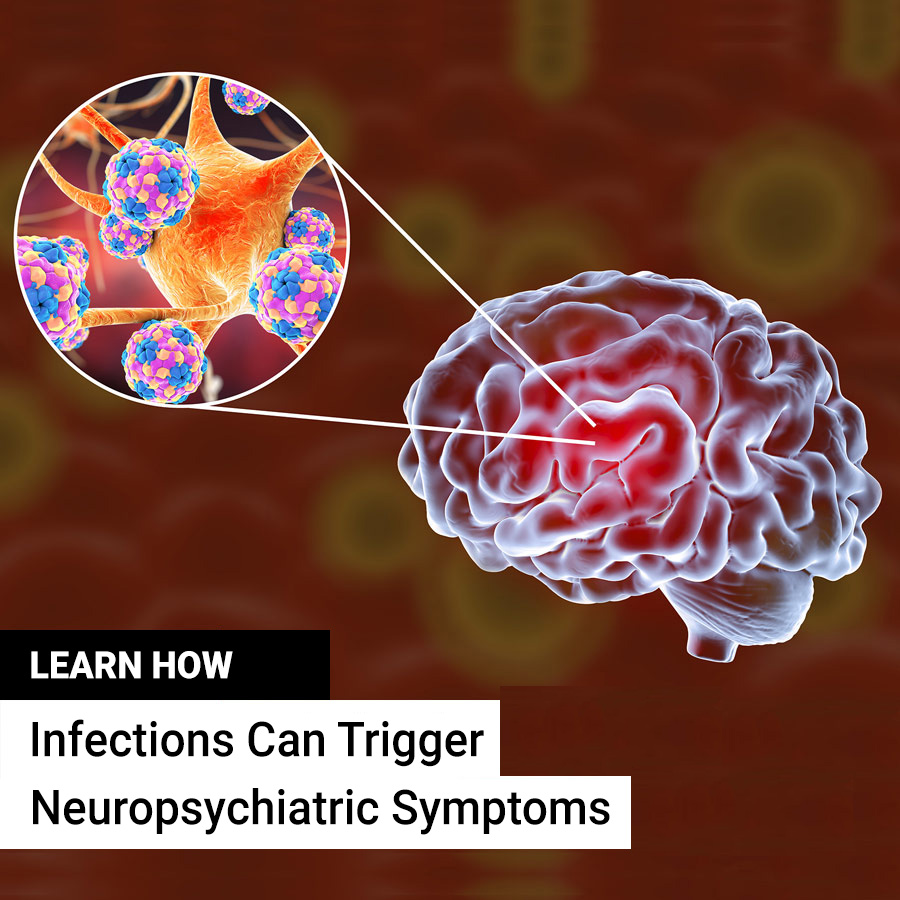Understanding why infections trigger autoimmune encephalitis and neuropsychiatric disorders & how the Cunningham Panel™ can aid in your diagnosis and treatment
Webinar Info
- Speaker: Craig Shimasaki, PhD, MBA – President & CEO, Moleculera Labs
- Aired: April 20 & 22, 2022
ABOUT THE WEBINAR
This webinar will provide a basic understanding of why certain infectious organisms tend to be identified in patients with autoimmune encephalopathy secondary to these infections and how the biological mechanism of molecular mimicry can lead to the production of autoantibodies, resulting in neuropsychiatric symptoms.
I will discuss how the diagnosis and treatment of underlying infections, inflammation and immune dysfunction can result in significant symptom improvements and how the biology and clinical science of the Cunningham Panel™ can be utilized to help identify and treat these patients.
Clinical data demonstrating how certain autoantibodies (measured with the Panel) correlate with specific neuropsychiatric symptoms will be reviewed. This understanding can provide guidance on other therapies that may be useful in the diagnosis and treatment of immune-mediated neuropsychiatric disorders.
PRESENTER
Craig Shimasaki, PhD, MBA
President & CEO
Moleculera Labs, Inc.
Craig Shimasaki is President and CEO of Moleculera Labs, a neuroimmunology precision medicine company focused on identifying underlying roots of neurologic, psychiatric, and behavioral disorders triggered by an autoimmune response. He is a medical research scientist with over 35 years of translational development experience in biochemical interactions, molecular biology, viral pathogenesis and infection-triggered neuropsychiatric disorders.
Dr. Shimasaki has worked at all stages of research and development from bench to bedside. His research included epitope mapping of HIV proteins, genetic based risk predictors of breast cancer, influenza and RSV diagnostics and therapeutics and pathogenesis of infection triggered neuropsychiatric disorders. As a businessperson, he co-founded multiple companies and led multiple products through the FDA approval process and is a co-inventor on multiple patents.
Dr. Shimasaki started his career at Genentech. He received his BS in Biochemistry from University of California at Davis, his PhD in Molecular Biology from the University of Tulsa, and his MBA from Northwestern University, Kellogg School of Business. He is an Adjunct Professor at the University of Oklahoma where he teaches biotechnology entrepreneurship. His passion is to help translate scientific and medical discoveries into acutely needed products so that more patients can live healthier lives.
This webinar is intended only for Medical Professionals.
The webinar content has been made available for informational purposes only. The information provided is not intended to be medical or healthcare advice for any individual medical problem, nor a substitute for medical or professional advice and services from a qualified healthcare provider.
By attending or viewing the webinar, you acknowledge and agree that we have not represented that any content provided in this webinar has the ability to diagnose a medical condition, prescribe treatment, or perform any other tasks that constitute the practice of medicine.
Moleculera hereby disclaims any and all liability to any party for any direct, indirect, implied, punitive, special, incidental, or other consequential damages arising directly or indirectly from any use of the webinar content, which is provided as is, and without warranties.
All rights reserved. No part of this presentation may be reproduced, distributed, or transmitted in any form or by any means, including recording, photocopying, or other electronic or other methods without the prior written consent of the publisher.
- Evidence of Borrelia Autoimmunity-Induced Component of Lyme Carditis and Arthritis
https://www.ncbi.nlm.nih.gov/pmc/articles/PMC548028/ - Harbingers of Mental Disease-Infections Associated With an Increased Risk for Neuropsychiatric Illness in Children (Editorial)
https://jamanetwork.com/journals/jamapsychiatry/article-abstract/2716978 - Clinical Evaluation of Youth with Pediatric Acute-Onset Neuropsychiatric Syndrome (PANS): Recommendations from the 2013 PANS Consensus Conference
https://www.ncbi.nlm.nih.gov/pmc/articles/PMC4340805/ - Autoantibody Biomarkers for Basal Ganglia Encephalitis in Sydenham Chorea and Pediatric Autoimmune Neuropsychiatric Disorder Associated With Streptococcal Infections
https://www.frontiersin.org/articles/10.3389/fpsyt.2020.00564/full - 6-month neurological and psychiatric outcomes in 236,379 survivors of COVID-19: a retrospective cohort study using electronic health records
https://www.thelancet.com/journals/lanpsy/article/PIIS2215-0366(21)00084-5/fulltext - Will COVID-19 Lead to Myalgic Encephalomyelitis/Chronic Fatigue Syndrome?
https://www.frontiersin.org/articles/10.3389/fmed.2020.606824/full - Tubulins and brain development – The origins of functional specification
https://www.sciencedirect.com/science/article/pii/S1044743116302500 - Evaluation of the Cunningham Panel™ in pediatric autoimmune neuropsychiatric disorder associated with streptococcal infection (PANDAS) and pediatric acute-onset neuropsychiatric syndrome (PANS): Changes in antineuronal antibody titers parallel changes in patient symptoms
https://pubmed.ncbi.nlm.nih.gov/31884258/ - Overview of Treatment of Pediatric Acute-Onset Neuropsychiatric Syndrome
https://www.ncbi.nlm.nih.gov/pmc/articles/PMC5610386/ - Therapeutic plasma exchange and intravenous immunoglobulin for obsessive-compulsive disorder and tic disorders in childhood
https://pubmed.ncbi.nlm.nih.gov/10513708/ - For information on diagnostic criteria and treatment of PANS and PANDAS, please visit: www.pandasppn.org.
Schedule: In-services for utilization of the Cunningham Panel™
We provide free, medical education services to assist clinicians in better understanding the Cunningham Panel™ utilization of results. This service is open to individual clinicians and group practices.







